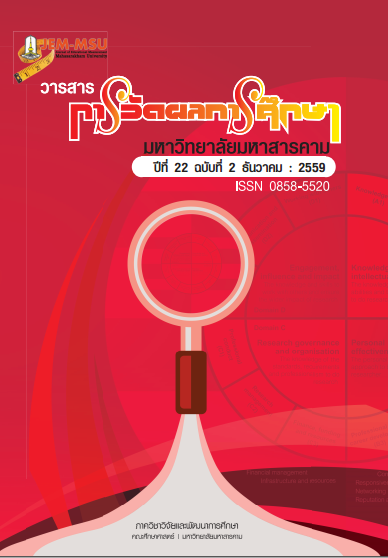The Development of Characteristic Indicators of Professional Teacher towards ASEAN Community in The Secondary Educational Service Area.
Main Article Content
Abstract
This research was aimed the development of characteristic indicators of professional
teacher towards ASEAN community in the secondary educational service area. The key
informants consisted of 14 Delphi experts who competent in teacher professional standard
principals, administrators towards ASEAN community, the learning management, knowledge,
development and evaluation which selected by the purposive sampling technique. The
collected data by applying tree attempts of Delphi Technique. The Delphi experts gave the
answers to the questionnaire for 3 rounds. For first round they answered an ended questions
as well as answer 5-point rating scale questionnaire for second and third rounds. Then the
data were analyzed by median and inter quartile ranges.
The finding showed that the characteristic indicators of professional teacher towards
ASEAN community in the secondary educational service area. Results showed that 5 aspects
of core factors with totally 93 indicators. They were classified into 24 characteristics of the
instructional development, 10 indicators of the use of technology for communication, 11
indicators of the use of the English language and Asian languages for communication, 22
indicators of personality development, 26 indicators of the self–development.
In conclusion, the developed characteristic indicators of professional teacher towards
ASEAN community in the secondary educational service area were fruitful for the teachers
and related educational organizations in every system. Moreover, these indicators can be
used as guidelines for planning, improving and evaluating the information of professional
teacher in order to develop high quality and more efficiency teaching .
Article Details
The content and information contained in the published article in the Journal of Educational Measurement Mahasarakham University represent the opinions and responsibilities of the authors directly. The editorial board of the journal is not necessarily in agreement with or responsible for any of the content.
The articles, data, content, images, etc. that have been published in the Journal of Educational Measurement Mahasarakham University are copyrighted by the journal. If any individual or organization wishes to reproduce or perform any actions involving the entirety or any part of the content, they must obtain written permission from the Journal of Educational Measurement Mahasarakham University.


